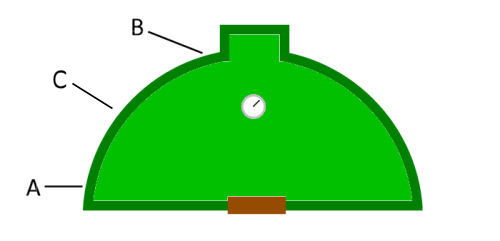 |
 |
Ceramic charcoal cookers are known for their ability to retain heat and one of the benefits of this property is that the outside of a
ceramic cooker will not get as hot as the outside of a metal cooker. Unfortunately, overzealous owners and dealers sometimes make
the claim that the outside of their ceramic charcoal cooker stays cool to the touch. Of course this is rubbish, so we thought we'd
take a few actual measurements to give you the real scoop on this topic.
First of all, what do various manufacturers actually say on the matter?
Kamado Joe — "The ceramic base and lid of our grills can get very warm, but incidental touching will not cause a burn injury."
Our testing has shown that some of these claims are a bit exaggerated. To see how hot ceramic charcoal cookers
actually get, we used a temperature controller to keep each cooker at 400°F for 2.5 hours. We then measured
the surface temperature of the dome using a thermocouple surface probe:
Imperial Kamado — "It's Safe. Outside surface may be touched while cooking."
Big Green Egg — "The innovative ceramic material (now based on space-age technology) keeps the outside surface far cooler than any gas grill" and "Surface stays cooler and is safer around children than metal grills".
Primo — "And the outer surface stays at a safe, warm-to-the-touch temperature."
Kamado — "The exterior tile is safe to touch."

Figure 1. Diagram showing location of temperature readings.
These are the results for a variety of cookers we have been able to test:
| Cooker | Location A | Location B | Location C |
|---|---|---|---|
| Large Big Green Egg | 180°F | 245°F | n/t |
| 2011 Komodo Kamado 23" | 130°F | 125°F | n/t |
| 2006 Komodo Kamado 23" | 110°F | 160°F | n/t |
| 2014 Vision Grills Classic B | 208°F | 265°F | n/t |
| 2015 Char-Griller Akorn | 181°F | 190°F | 135°F |
| Kamado Joe Classic | 182°F | 236°F | n/t |
| Kamado Joe Big Joe | 180°F | 240°F | n/t |
| Primo XL | 190°F | 235°F | n/t |
As you can see, all the cookers except the 2011 Komodo Kamado get quite hot in all areas of the dome. (The Komodo Kamado cooker is unique in that it is made of two layers of refractory material. One provides strength, the other provides insulation.) As a point of reference most humans begin to feel pain when they touch a liquid or solid at 115°F. With the exception of the 2011 Komodo Kamado, we couldn't keep our hand on any of these "hot spots" for any length of time at all. Just a quick brush was all we could manage. Trust us. This is hot.
And just for fun, we heated up a large Big Green Egg cooker to 750°F for 90 minutes. Here are the temperatures we measured:

So clearly, the surface temperature depends on the material, thickness and construction of the walls of the cooker, as well as the temperature you are cooking at. Some cookers get quite hot, too hot to touch, while others remain cool enough that you can actually touch them for a few seconds. Needless to say, however, it's best not to find out how hot your cooker is via an unplanned experiment. No ceramic charcoal cooker will remain "cool to the touch."
You can support this website by shopping at The Naked Whiz Website Store and Amazon.com
|